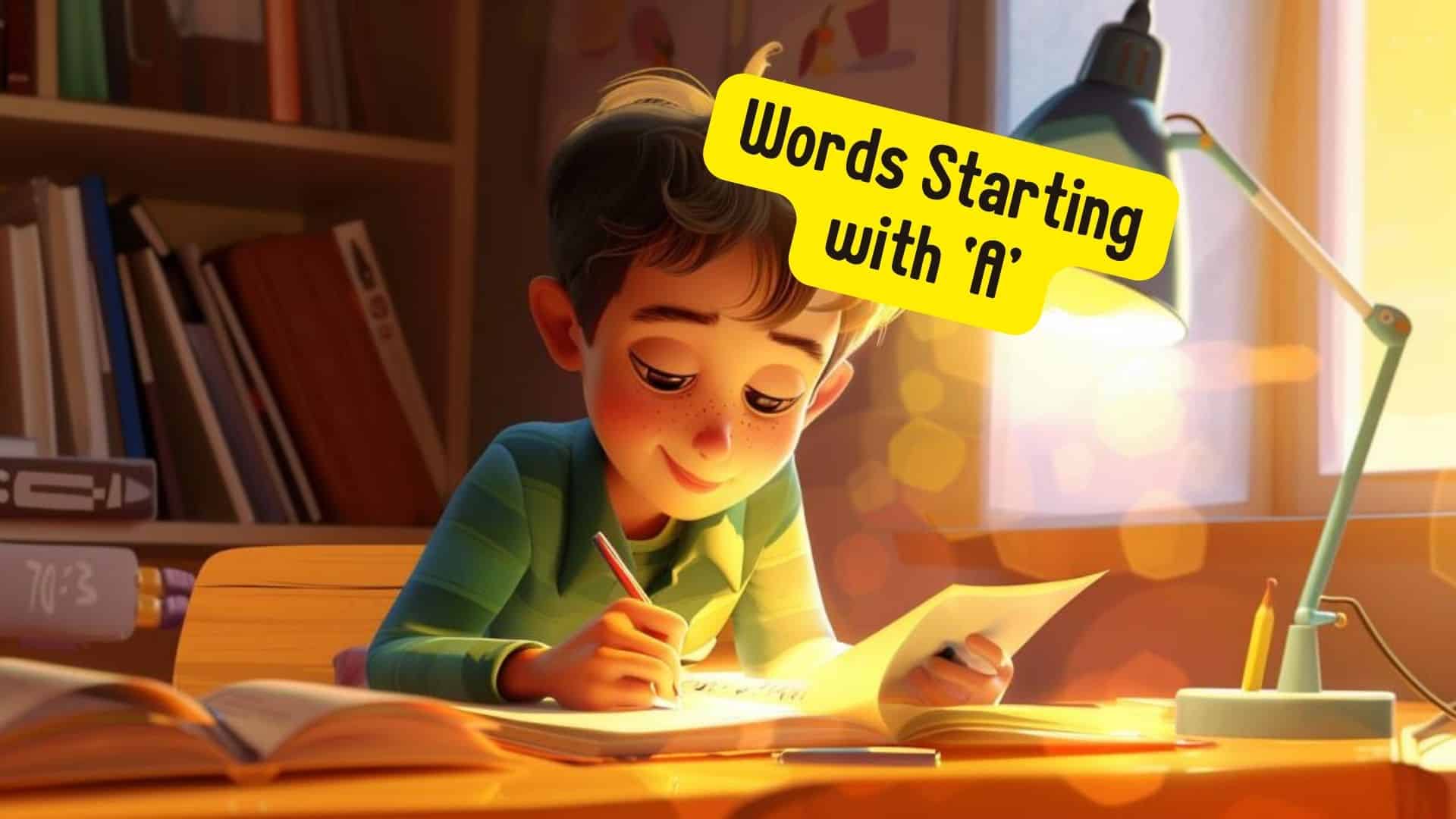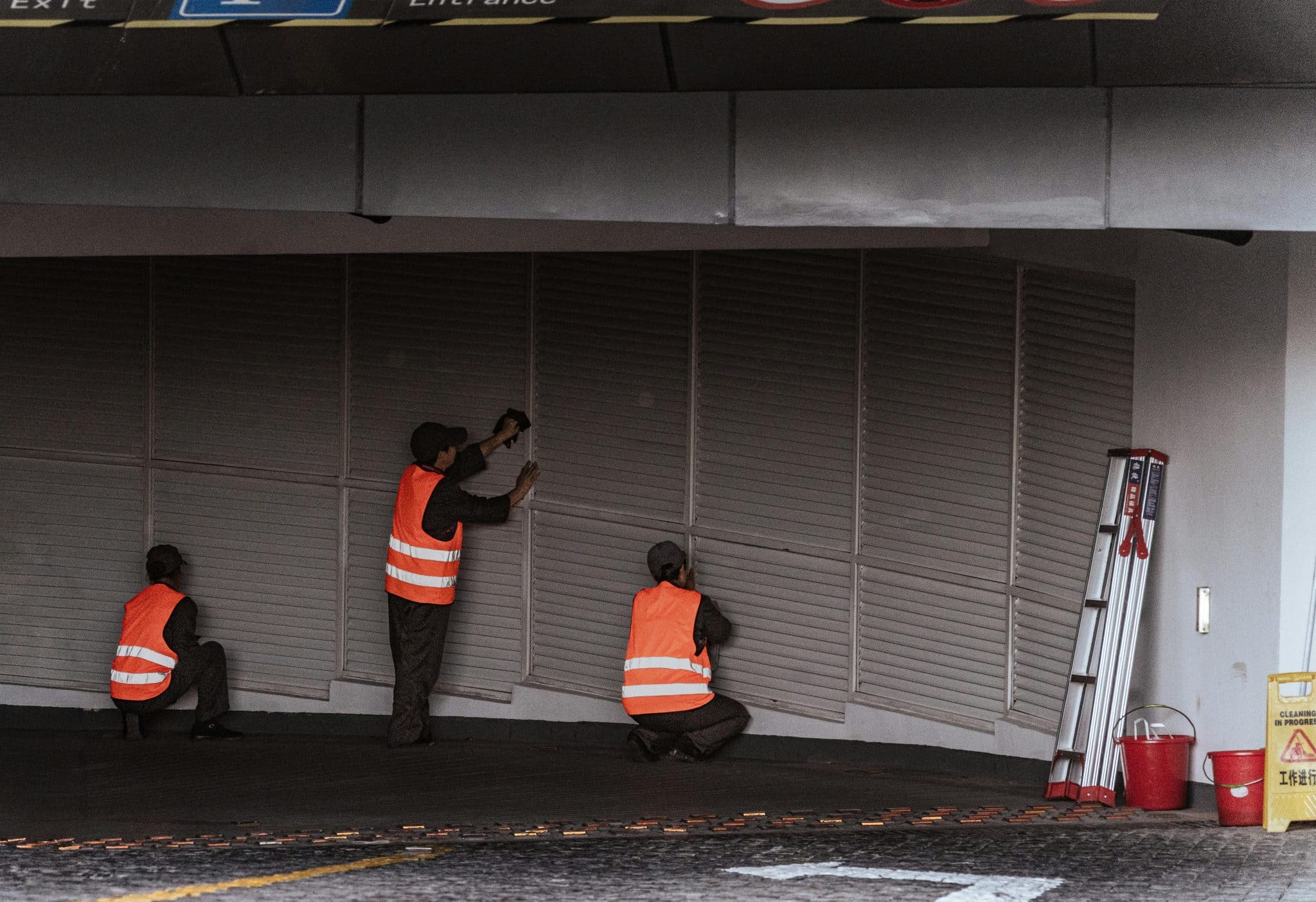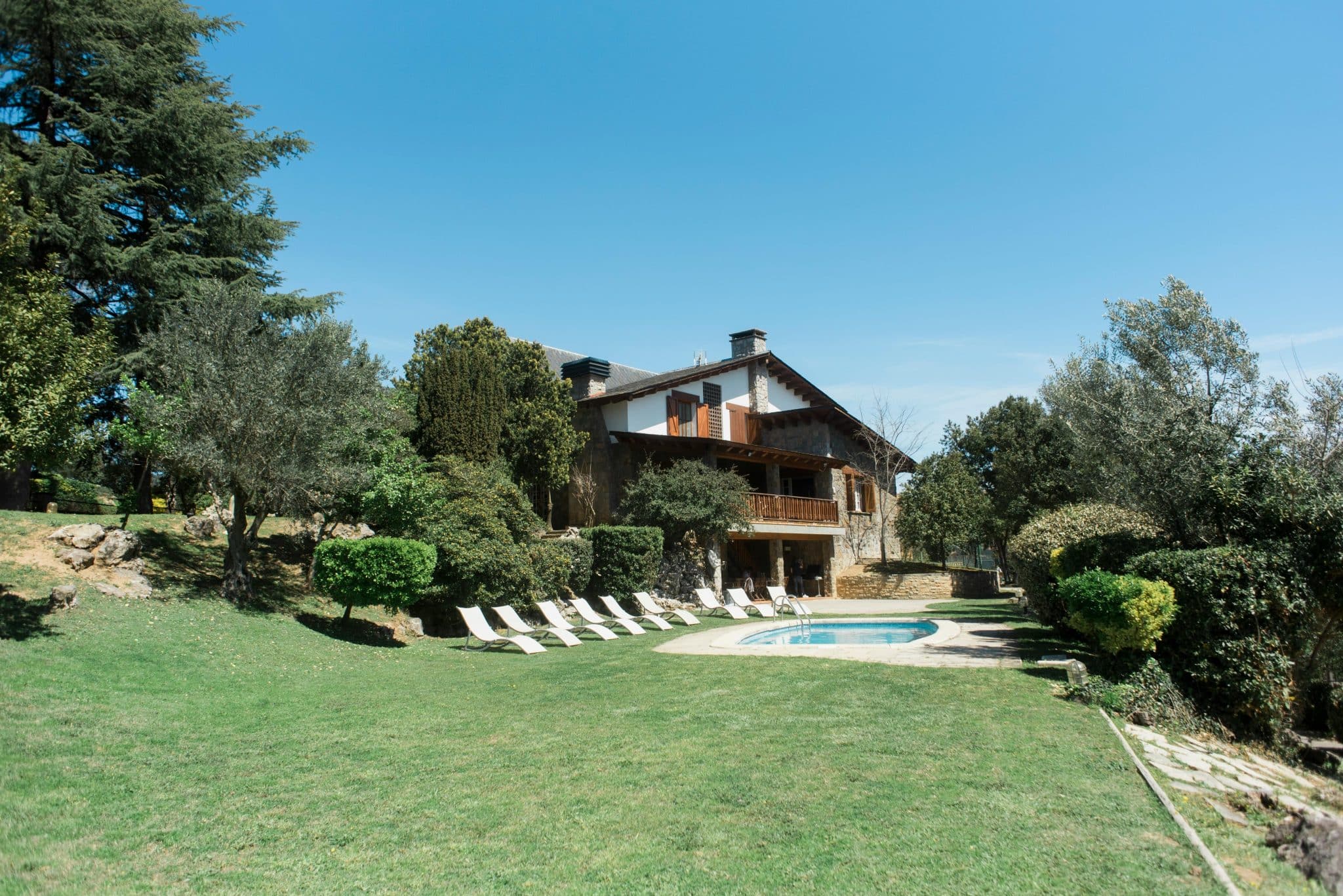Learning words that start with the letter “A” is a key step in every child’s language development.
These words are often short, simple, and easy to remember, making them perfect for young learners just starting to build their vocabulary.
Many “A” words are common in everyday speech, so children will likely hear and use them frequently.
By focusing on “A” words, we can help kids develop a strong foundation in the alphabet and basic phonics.
Plus, many fun and engaging “A” words exist to explore, from exciting action verbs to adorable animal names.

Animals and Nature
- Ant: A small insect that lives in a complex social colony.
- Alligator: A large reptile with sharp teeth and a powerful tail.
- Aardvark: A nocturnal animal that eats ants and termites.
- Alpaca: A South American animal related to the llama.
- Antelope: A fast-running deer-like animal.
- Armadillo: A small mammal with a protective shell.
- Avocado: A green fruit with a large pit and creamy flesh.
- Acorn: The nut of the oak tree.
- Almond: An edible nut with a hard shell.
- Apricot: A small, soft fruit with orange-yellow skin and flesh.
- Asparagus: A green vegetable with long, slender stalks.
- Aurora: A natural light display in the sky, usually near the polar regions.
- Algae: Simple, non-flowering plants found in water or damp places.
- Aloe: A plant with thick, fleshy leaves that has soothing properties.
- Amber: A yellowish-brown fossil resin.
- Aloe: A plant with thick, fleshy leaves that can heal skin.
- Aquarium: A tank for keeping live fish and other water creatures.
- Apple: A round fruit with red, yellow, or green skin and sweet white flesh.
- Aspen: A type of tree with leaves that tremble in the breeze.
- Ash: The powdery residue left after the burning of a substance.
- Acacia: A type of tree or shrub with yellow or white flowers.
- Amphibian: A cold-blooded animal that can live both in water and on land.
- Animal: A living creature that is not a plant.
- Antler: A bony, branched structure on the head of deer.
- Apple: A round fruit with red, yellow, or green skin and sweet white flesh.
- Acorn: The nut of the oak tree.
- Arrowhead: The pointed end of an arrow.
- Asphalt: A dark, sticky substance used for paving roads.
Places and Geography
- Arctic: The region around the North Pole.
- Antarctic: Relating to the region around the South Pole.
- Avenue: A wide street in a town or city.
- Atlas: A book of maps.
- Archipelago: A group of islands.
- Arctic: The region around the North Pole.
- Atlantic: The ocean between the Americas and Europe/Africa.
- Asia: The largest continent, located mainly in the Eastern and Northern Hemispheres.
- Australia: A country and continent surrounded by the Indian and Pacific Oceans.
- Argentina: A country in South America.
- Alaska: The largest and northernmost state of the USA.
- Alps: A major mountain range in Europe.
- Amazon: The largest river by discharge volume of water in the world.
- Antarctica: The southernmost continent, containing the South Pole.
- Auckland: The largest city in New Zealand.
- Athens: The capital city of Greece.
- Arizona: A state in the southwestern region of the USA.
- Aberdeen: A city in Scotland.
- Atlantic: The ocean between the Americas and Europe/Africa.
- Austria: A landlocked country in Central Europe.
- Andes: The longest continental mountain range in the world, located in South America.
- Athens: The capital of Greece.
- Albany: The capital city of the state of New York, USA.
- Aspen: A town in Colorado known for its ski resorts.
- Alexandria: A city in Egypt founded by Alexander the Great.
- Angola: A country in Southern Africa.
- Amman: The capital of Jordan.
- Arkansas: A state in the southern region of the USA.
Science and Technology
- Astronaut: A person who travels into space.
- Asteroid: A small rocky body orbiting the sun.
- Astronomy: The study of stars, planets, and other objects in space.
- Atom: The basic unit of a chemical element.
- Algorithm: A process or set of rules to be followed in calculations or problem-solving.
- Algebra: A branch of mathematics dealing with symbols and equations.
- Altitude: The height of an object or point in relation to sea level.
- Antibiotic: A medicine that inhibits the growth of or destroys microorganisms.
- Autopilot: A device for keeping an aircraft on a set course without human intervention.
- Acrobat: A performer skilled in gymnastics.
- Aqueduct: A structure for carrying water across long distances.
- Algorithm: A process or set of rules to be followed in calculations.
- Antibiotic: A medicine that inhibits the growth of or destroys microorganisms.
- Android: A robot with a human appearance.
- Antenna: A device for receiving or transmitting signals.
- Arcade: A place with video games and other amusements.
- Autumn: The season between summer and winter.
- Asteroid: A small rocky body orbiting the sun.
- Astrology: The study of the movements and relative positions of celestial bodies.
- Atmosphere: The envelope of gases surrounding the earth.
- Aviation: The flying or operating of aircraft.
- Appliance: A device or piece of equipment designed to perform a specific task.
- Astronomer: A scientist who studies celestial bodies.
- Artificial: Made or produced by human beings rather than occurring naturally.
- Antivirus: A software designed to detect and destroy computer viruses.
- Ampere: A unit of electric current.
- Analog: A type of signal or information represented by a continuously variable physical quantity.
- Astrophysics: The branch of astronomy concerned with the physical nature of stars and other celestial bodies.
Everyday Objects and Actions
- Airplane: A flying vehicle with wings and engines.
- Anchor: A heavy object used to keep a ship in place.
- Arrow: A pointed weapon shot from a bow.
- Axe: A tool with a heavy metal blade for chopping wood.
- Apron: A garment worn to protect clothes while cooking.
- Album: A book with blank pages for storing photos or stamps.
- Alarm: A device that makes a loud sound to warn of danger.
- Anchor: A device used to moor a vessel to the sea bottom.
- Alley: A narrow passage between buildings.
- Arrowhead: The pointed end of an arrow.
- Aisle: A passage between rows of seats.
- Automobile: A vehicle designed for passenger transportation.
- Anvil: A heavy iron block used for shaping metal.
- Antenna: A device for receiving or transmitting signals.
- Ashtray: A small dish for cigarette butts and ash.
- Album: A book with blank pages for storing photos or stamps.
- Alarm: A device that makes a loud sound to warn of danger.
- Anchor: A heavy object used to keep a ship in place.
- Arrow: A pointed projectile shot from a bow.
- Attic: The space just below the roof of a house.
- Apron: A garment worn to protect clothes while cooking.
- Antique: An old object, often valuable or collectible.
- Attic: The space just below the roof of a house.
- Anvil: A heavy iron block used in blacksmithing.
- Arcade: A place with video games and other amusements.
- Aisle: A passage between rows of seats.
- Alarm: A device that makes a loud sound to warn of danger.
- Anvil: A heavy iron block used for shaping metal.
- Aquarium: A tank for keeping live fish and other water creatures.
- Apron: A garment worn to protect clothes while cooking.
- Album: A book with blank pages for storing photos or stamps.
- Amulet: An object worn for magical protection.
- Arrow: A pointed weapon shot from a bow.
- Ashtray: A small dish for cigarette butts and ash.
- Album: A book with blank pages for storing photos or stamps.
- Armor: Protective clothing worn in battle.
- Ankle: The joint connecting the foot with the leg.
- Alley: A narrow passage between buildings.
- Anchor: A device used to moor a vessel to the sea bottom.
- Arcade: A place with video games and other amusements.
- Aisle: A passage between rows of seats.
- Amulet: A small object worn to protect against evil or bring good luck.
- Arrow: A pointed projectile shot from a bow.
Feelings and Emotions
- Amaze: To fill with wonder or astonishment.
- Amuse: To entertain or make someone laugh.
- Anger: A strong feeling of displeasure or hostility.
- Awe: A feeling of reverential respect mixed with fear or wonder.
- Affection: A gentle feeling of fondness or liking.
- Agony: Extreme physical or mental suffering.
- Anxiety: A feeling of worry or unease.
- Apathy: Lack of interest, enthusiasm, or concern.
- Astonish: To surprise or impress greatly.
- Apprehension: Anxiety or fear that something bad will happen.
- Admire: To regard with respect or warm approval.
- Annoy: To irritate or make someone a little angry.
- Amusement: The state of being entertained or finding something funny.
- Appreciate: To recognize the full worth of something.
- Adore: To love and respect someone deeply.
- Applause: Clapping to show enjoyment or approval.
- Astonish: To surprise or impress greatly.
- Awe: A feeling of reverential respect mixed with fear or wonder.
- Anticipation: A feeling of excitement about something that is going to happen.
- Awe: A feeling of reverential respect mixed with fear or wonder.
- Admiration: Respect and warm approval.
- Astonish: To surprise or impress greatly.
- Aggravate: To make someone annoyed or irritated.
- Alarm: A feeling of fear or anxiety that something dangerous may happen.
- Adoration: Deep love and respect.
- Astonish: To surprise or impress greatly.
- Affection: A gentle feeling of fondness or liking.
- Aggravate: To make someone annoyed or irritated.
- Apprehensive: Anxious or fearful that something bad will happen.
- Agony: Extreme physical or mental suffering.
- Anguish: Severe mental or physical pain or suffering.
- Amazement: A feeling of great surprise or wonder.
- Admire: To regard with respect or warm approval.
- Annoyance: The feeling or state of being annoyed.
- Astonishment: Great surprise.
Conclusion
Learning “A” words is a fantastic way to help children expand their vocabularies and develop a lifelong love of language.
Kids can build a strong foundation in literacy and communication by exploring entertaining action words, amazing animals, awesome adjectives, and essential academic terms.
Through interactive games, creative projects, and engaging activities, children can internalize these “A” words and gain the confidence to use them daily.
As parents and educators, it’s our job to make learning fun and meaningful, and focusing on “A” words is a great place to start.
So the next time you’re looking for a way to help your child grow and thrive, remember the power of “A” words.
You can open up a new world of language and learning together with a little creativity and enthusiasm!
Frequently Asked Questions
What Age Group Is Best Suited For These ‘A’ Word Activities?
These activities are ideal for children aged 4-7, as they are learning to read, write, and expand their vocabularies during this stage of development.
How Can These Activities Help In Early Childhood Education?
‘A’ word activities enhance language skills, creativity, and cognitive development, crucial for early childhood education and future academic success.








